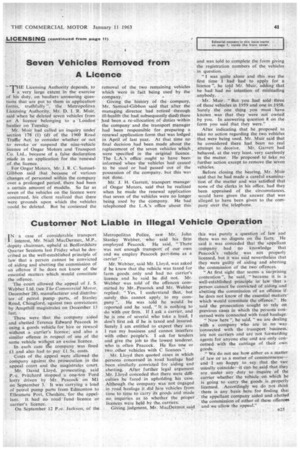Customer Not Liable in Illegal Vehicle Operation
Page 43

If you've noticed an error in this article please click here to report it so we can fix it.
IN a case of considerable transport interest, Mr. Niall MacDermot, 7VI.P„ deputy chairman, upheld at Bedfordshire Quarter Sessions last Friday what he described as the well-established principle of law that a person cannot be convicted of aiding and abetting the commission of an offence if he does not know of the essential matters which would constitute the offence.
The -court allowed the appeal of J. S. Webber Ltd. (see The Commercial Motor, December 28), manufacturer and distributor of petrol pump parts, of Stanley Road, Chingford,'against two convictions by Ampthilt magistrates on December 13 last.
These were that the company aided and abetted Terence Edward Peacock in using a goods vehicle for hire or reward without a carrier's licence; and also a similar offence in respect of use of the same vehicle without an excise licence. In each case tge company was fined £1 and also had to pay £1.5s. costs.
Costs of the appeal were allowed the company against the prosecution in the appeal court and the magistrates court.
Mr. David Lloyd, prosecuting, said P.-c. Pritchard stopped a one-ton Ford lorry driven by Mr. Peacock on MI on September 3. It was carrying a load of petrol pump parts from Edmonton to Ellesmere Port, Cheshire, 'for the appellant. It had no road 'fund licence or carrier's licence.
On September 12 Jackson, of the Metropolitan Police, saw • Mr. John Stanley Webber, who said his firm employed Peacock. He said, " There was not enough transport of our own and we employ Peacock part-time as a carrier ".
Mr. Webber, said Mr. Lloyd, was asked if he knew that the vehicle was taxed for farm goods only and had no carrier's licence and he said he did not. Mr. Webber was told of the offences committed by Mr...Peacock and .Mr. Webber replied: "Yes, I understand that, but surely this, cannot apply, to my company ". He was told he would be reported and he said, "It is nothing to do with our firm. If I ask a carrier, and he is one of sevet'al who take a load, I don't first ask if he is taxed and insured. Surely I am entitled to expect they are. I run my .business and cannot -interfere with other, people's ' r ask for tenders and give the job to the lowest tenderer, who is often Peacock. He has tine or two . other vehicles with C licences ".
• yr. Lloyd then quoted cases in which persons concerned in road haulage had been similarly convicted for aiding and abetting. After .further legal argument Mr. ,Lloyel Conceded that there were difficulties he' faced in upholding his case. Although the 'company. was .nOtengaged in road haulage it did hire vehicles from time to time to carry" its goods and made no inquiries as to whether the proper licences were held by the carriers.
Giving judgment, Mr. MacDerinot..said
this was purely a question of law and there was no dispute on the facts. He said it was conceded that -the appellant company, had no knowledge that Peacock's , vehicle. was not properly licensed, but it was said nevertheless that they were 'guilty of aiding and abetting the commission* of the two' offences.
" At first sight that seems a'surprising contention ", he said, "because it is a well-established principle in law that a person cannot be Convicted of aiding and abetting the commission of an offence if he does not know of the essential matters which would constitute the offence." He said the prosecution sought to rely on previous cases in which the persons concerned were connected with road haulage.
"Nowhere ", he 'said, "we tire dealing
with a company who are in no way connected with the transport ,business, "are not carrier's and are not forwarding agents for anyone else and are only concerned with the carriage of their own goods.
" We do not see-how either as a matter
of law or as a matter of commonsense-7, and I am happy to say that the two usually eoincideit can be said that they are under any duty to inquire of the Carrier whether the vehicle on which he
is going to carry the goods is properly licensed. Accordingly we to not-think there is any basis here for finding that the appellant company aided and abetted the commission of either of these offences and -we allow the appeal:" •
















































































































